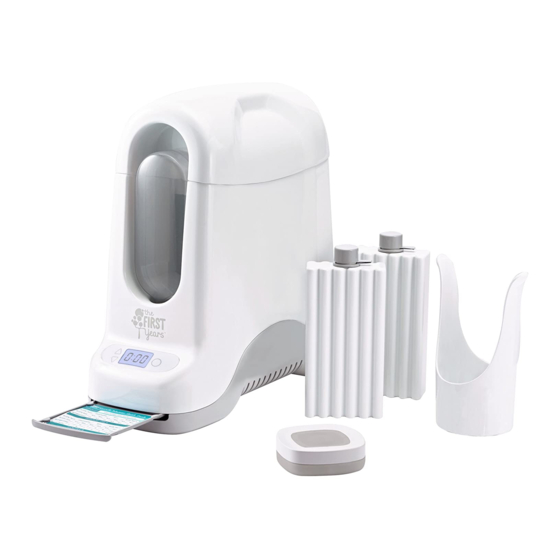
Table of Contents
Advertisement
Remote Bottle Warmer – Instructions (rev 8)
Section 1: Cover:
o TFY Logo (top left)
o Remote Bottle Warmer (top right)
o Instruction Manual
o Line Drawing/Exploded View of pieces (labeled)
Base unit
Cover
Water reservoir
Lift-out basket
Freezer bottles (2)
Control panel
Warming time reference drawer
Remote button
o "Questions? Let's talk!
help@thefirstyears.com
USA & Canada 800-704-8697
(Reference image from the CMF...CMF lists extra parts and unneeded info...use list
above)
Exploded view of the control panel with callouts pointing to:
Up arrow button
Down arrow button
LCD Screen
Low battery indicator
Error indicator
Power button
Page 1 of 9
Advertisement
Table of Contents

Summary of Contents for The First Years Remote Bottle Warmer
-
Page 1: Section 1: Cover
Remote Bottle Warmer – Instructions (rev 8) Section 1: Cover: o TFY Logo (top left) o Remote Bottle Warmer (top right) o Instruction Manual o Line Drawing/Exploded View of pieces (labeled) Base unit Cover Water reservoir Lift-out basket ... -
Page 2: Section 2: Safeguards
Section 2: Safeguards IMPORTANT SAFEGUARDS 1. Read all instructions before using. 2. Always use the included lift out basket to warm or sterilize 3. Do not place your hands in or around the warming chamber during heating. 4. Allow steam to disperse from the base unit (after removing lid) before removing warming chamber basket. -
Page 3: Section 3: To Clean
Section 3: To Clean Thank you for purchasing this Remote Bottle Warmer. We hope you enjoy using it. While we have designed this to be easy to use, it does take a little explaining and we want to best prepare you to successfully and safely use this item. After reading through the instruction booklet, we hope that you understand how easy it really is. -
Page 4: Section 4: To Use
Section 4: To Use TO USE FREEZING THE FREEZER BOTTLES (2) 1. Remove/Unscrew the cap 2. Fill with clean water to the fill line. Do not overfill. 3. Replace/Screw on the cap 4. Place in freezer until frozen solid (allowing at least hours for water to freeze) ... -
Page 5: Preparing The Remote
PREPARING THE REMOTE 1. Remove battery door, using a phillips screw driver 2. Insert 4 AAA batteries (ref image) 3. Replace battery door Line drawing of the bottom of the remote showing a screwdriver unscrewing the door Line drawing of the inside of where the batteries go (showing positive and negative outlines for clarity) PAIRING THE REMOTE TO THE BASE UNIT Pairing creates a coded signal so that only the remote’s signal can remotely activate the... - Page 6 PREPARING THE UNIT FOR STAND-BY MODE 1. Place the unit on a flat surface and plug into AC outlet. 2. Remove the lid from the base unit. 3. Place the 2 freezer bottles and the lift-out basket into the unit. 4.
- Page 7 ACTIVATING THE WARMING CYCLE From remote Press and hold the remote button down for 2 seconds to activate warming to the preset warming time NOTE: o While the unit is warming, the remote will pulse a soft orange glow so you know it is warming.
-
Page 8: Section 5: Warranty
SECTION 5: Warranty Our Limited Warranty and Warranty Period When we use the terms “we,” “us” and “our,” we are referring to TOMY, and when we use the terms “you” and “your” we mean the original end-user customer. Our products are guaranteed to be free from defects in material and workmanship under normal and intended use for a period of 90 days from the date of your purchase. -
Page 9: Section 5: Fcc Statement
SECTION 5: FCC Statement Note: This equipment has been tested and found to comply with the limits for a Class B digital device, pursuant to Part 15 of the FCC Rules. These limits are designed to provide reasonable protection against harmful interference in a residential installation. This equipment generates, uses and can radiate radio frequency energy and, if not installed and used in accordance with the instructions, may cause harmful interference to radio communications.


Need help?
Do you have a question about the Remote Bottle Warmer and is the answer not in the manual?
Questions and answers